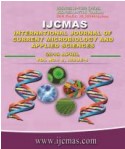


 National Academy of Agricultural Sciences (NAAS)
National Academy of Agricultural Sciences (NAAS)

|
PRINT ISSN : 2319-7692
Online ISSN : 2319-7706 Issues : 12 per year Publisher : Excellent Publishers Email : editorijcmas@gmail.com / submit@ijcmas.com Editor-in-chief: Dr.M.Prakash Index Copernicus ICV 2018: 95.39 NAAS RATING 2020: 5.38 |
The aim of the study was to isolate and identify the salt tolerant growth promoting bacteria from rhizosphere soil of Sesuvium portulacastrum and also from the soils of dye and textile effluent contaminated sites (Andipalayam, Orathupalayam, Mangalam and Palayakottai villages of Tirupur District, Tamil Nadu) to remediate the salt contaminated soil. On total twenty five strains were selected based on the distinct morphological characters on R2A agar medium supplemented with 3 % NaCl. These strains were further screened for salt tolerance potential and growth with various concentrations of NaCl (0.5%, 1%, 2% and 3%). Only 4 strains (OPS2, OPS4, APS1 and APS3) shown the highest salt tolerance potential. The bacterial strain OPS2 has shown the highest removal of salt from the medium. The phylogenetic analysis revealed that 3 strains belonged to Bacillus sp. and a single strain was within Paenibacillus sp. Further these four strains were characterised for plant growth promotion activities. A pot culture experiment was conducted to assess the role of bioamendments and bioinoculants in enhancing salt removal capacity of S. portulacastrum. The maximum EC reduction (72.27%) and sodium removal (80.29%) was observed in the treatment Soil+ Sesuviumportulacastrum applied with Vermicompost (5tha-1) and Salt tolerant growth promoting rhizobacteria (ST-PGPR).
 |
 |
 |
 |
 |